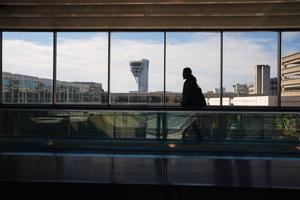U.S. airlines are launching significant flight reductions at the country’s busiest airports due to the ongoing government shutdown. Starting Friday, airlines will cut hundreds of flights at airports in major cities, including New York, Los Angeles, Dallas, and Chicago, according to a list distributed to airlines and obtained by The Associated Press. The Federal Aviation Administration (FAA) has ordered a phased reduction of air traffic at 40 airports across more than two dozen states, a move that is expected to disrupt travel nationwide.
The initial phase will see airlines eliminating 4% of flights at these airports, gradually increasing to 10% in the coming days. United Airlines confirmed it will cut 4% of its weekend flights based on FAA guidance, as the agency aims to alleviate pressure on air traffic controllers who are currently working without pay. As of Thursday afternoon, the FAA had not released an official order detailing the implementation of these cuts.
Travelers with plans for the weekend are anxious as airlines scramble to adjust their schedules. The list of affected airports includes major hubs and popular tourist destinations, such as Atlanta, Denver, Orlando, Miami, and San Francisco. Notably, cities like Houston and Chicago will see multiple airports impacted, amplifying the potential for widespread travel disruptions.
Impact on Passengers and Airlines
The flight reductions come just weeks before the busy holiday season, prompting many travelers to reconsider their plans. Fallon Carter, who had a flight booked from New York to Tampa, Florida, cancelled her trip due to uncertainty about her return to Long Island for a wedding. “I don’t know if I get there, will I get home?” she expressed.
The FAA’s decision to implement a 10% reduction in air traffic in high-volume markets is aimed at maintaining safety as air traffic controllers report signs of strain during the shutdown. Controllers have been working overtime without pay since the shutdown began on October 1, 2023, leading to increased absenteeism and staffing shortages.
Industry analyst Henry Harteveldt remarked on the extensive implications of these cuts, stating, “This is going to have a noticeable impact across the U.S. air transportation system.” Airlines, including United, Delta Air Lines, and American Airlines, have stated they will offer refunds to passengers who opt not to travel, even on non-refundable tickets.
Wider Implications for Air Travel and Logistics
The flight cuts may also disrupt logistics operations, affecting package deliveries at key distribution centers. Airports in Memphis, Tennessee, and Louisville, Kentucky—the latter being the site of a recent cargo plane crash—are on the list of impacted locations. According to estimates from aviation analytics firm Cirium, as many as 1,800 flights could be cancelled daily, impacting over 268,000 passengers.
Airlines are accustomed to managing cancellations during severe weather, but the current situation is unprecedented in its duration and context. “We’re in new territory in terms of government shutdowns,” stated Bryan Bedford, FAA administrator. As airlines begin to notify passengers of cancellations, many are facing travel plans disrupted with little notice.
The ongoing shutdown is creating unnecessary strain on the air travel system and eroding public confidence in U.S. air travel, as highlighted by Geoff Freeman, President and CEO of the U.S. Travel Association. Travelers like Kelly Matthews from Michigan have already begun cancelling trips, empathizing with the challenges faced by federal employees who have been working without pay.
The situation continues to develop, and passengers are urged to stay informed about their flight status as airlines navigate these challenging circumstances.
